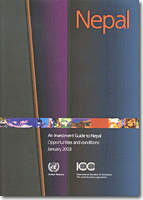
Nepal is located between two of the world´s largest markets: China to the north and India to the south. A trade treaty first signed in 1991 and renewed in 2002 guarantees Nepali manufactures duty-free access to the Indian market, subject to certain qualifications. In addition, as a least developed country, Nepal is entitled to preferential treatment in a number of rich markets. The European Union´s Everything But Arms initiative is particularly relevant in this context. Two other advantages, according to investors already in Nepal, are a low-cost and non-hostile workforce and a small and accessible bureaucracy.
The natural as well as cultural assets of Nepal offer very substantial opportunities to investors. The country has a range of climatic conditions - from the tropical to the sub-arctic - and a terrain that is mountainous in the north, hilly in the middle and near sea level in the south. Many niche agricultural products can thus be grown in Nepal, medicinal herbs and high-quality tea being but two examples. There is also huge potential for hydropower. About 44,000 MW is thought to be economically feasible, which may be contrasted with the 528 MW currently being generated.
Tourism is another area with enormous potential. Nepal has spectacular natural assets such as Mount Everest - the top of the world - and seven other peaks of 8,000 metres and higher. It also has a rich cultural heritage and a great diversity of ethnic groups with distinctive traditions: Lumbini in western Nepal is the birthplace of the Buddha, while Bhaktapur in the Kathmandu valley is a perfectly preserved mediaeval town full of Hindu temples.
The problems in Nepal are those that commonly beset poor countries: low literacy and skill levels; insufficient and poorly maintained infrastructure; and pervasive administrative weakness.
| ||


